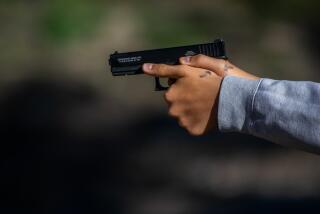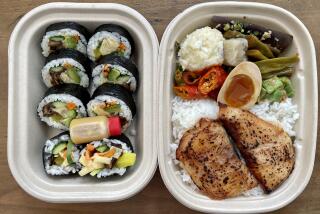Karate Style Inspired by Love of Nature, Culture, Aesthetics : Profile: Vietnamese <i> quyen dao </i> master Quoc Huy Ha’s accomplishments have come despite adversity and loss.
- Share via
WESTMINSTER — When Quoc Huy Ha explains the karate style he developed, he could be describing his life.
“ Quyen dao is like a river,” the grand master said, using the Vietnamese name for the martial art, rather than the Japanese karate more familiar to Americans.
“The river is always running, always moving, even if there is an obstacle,” he said through an interpreter.
Ha, 47, has overcome daunting obstacles on an odyssey that led from a re-education camp in his native Vietnam to Westminster, where he now runs a martial-arts school.
Internationally recognized in his field, he coached his son Trieu Chung to an unprecedented fourth championship in the same prestigious tournament that launched the careers of Bruce Lee and Chuck Norris.
Ha, who spends his evenings writing poetry over cups of strong iced coffee, is also revered in Vietnam as an artist and holds several national awards for his drawings and paintings.
His achievements have come in spite of adversity and loss, including the death of his wife in Vietnam in the 1970s.
Last year, a fire destroyed his karate studio, reducing to ashes hundreds of trophies, photographs, uniforms, equipment and the manuscript of a book he was writing. Uninsured, he lost everything.
But Ha, a modest man who exudes dignity and quiet strength, is not a quitter. He and his family are rebuilding--as they have done before.
When the U. S. military began its gradual withdrawal from Vietnam and was handing over more responsibility to the South Vietnamese, Ha was a graduate student at Saigon’s National University of Fine Arts. He joined the Army of the Republic of Vietnam as an officer and, during the war, trained both American and Vietnamese soldiers in the martial arts, which he had studied since childhood.
In 1975, after the fall of Saigon, Ha was caught by the Communists and spent more than three years in labor camps before escaping.
He will say little of his experience there except, “it was like a hell on the living side.”
Though other prisoners fleeing the camp had been recaptured and later put to death, Ha was determined to escape. One night he slipped away, crawling through the jungle for miles on bleeding hands and knees.
During a harrowing journey to Saigon that took him across rivers and over mountains, he observed birds and animals whose movements struck him as similar to the graceful, controlled motions of the martial arts.
The quyen dao (pronounced quinn dow) style he continued to develop after arriving in the United States in 1979 reflects what he saw on his voyage, and also borrows from both Japanese and Vietnamese martial arts traditions.
The specific moves of quyen dao , he said, were inspired by his heritage: Vietnamese landmarks, past kings and heroes, the characters of Southeast Asian legend and folklore.
In quyen dao, Ha combines poetry, art and patriotism with karate. In teaching it, he demands strict discipline.
Jennifer Nguyen, one of Ha’s best students, hopes eventually to teach quyen dao herself and pass along her grand master’s legacy.
“Every time we go to tournaments, I’m really honored as a student,” she said, “because he’s at the top.”
Ha’s son Trieu Chung, who calls his father “my grand master,” said that because the teacher is an artist, “there’s a definite sense of sculpture in the forms and techniques he creates.”
A graduate student of American history at USC, Trieu Chung, 23, is the best-known practitioner of quyen dao, and with his skill he has impressed karate judges at the highest levels of competition.
“When I was young, I used to dream about just getting on stage in the finals,” Trieu Chung said, adding modestly, “I’ve gone a bit beyond that now.”
In August, he became the first person to win four consecutive championships in the 32nd annual Ed Parker international karate competition in Long Beach. The tournament, which in 1964 showcased Bruce Lee’s awesome talent, draws about 5,000 competitors each year and is the world’s largest and most prestigious.
Leilani Parker has run the tournament since her husband, Ed, died four years ago. She has watched Trieu Chung and the Ha style dazzle both judges and competitors in the kata, or forms, competition, which emphasizes precision of technique and individual style.
“That was really a first for us,” Parker said of Trieu Chung’s fourth championship. “Nobody else has been able to do that.”
Trieu Chung’s most dazzling move is a vertical kick that a writer for Sport Karate magazine described this way: “It went beyond being vertical anymore. When he performed a front kick, it actually became a rear kick as his foot went over his shoulder and beyond the back of his head, so that his toes pointed directly behind him.”
His brother, Dong Quan, 22, was also schooled by their father and has applied his training as a Hollywood stuntman. He has a regular role on the Fox television series “VR Troopers” and recently portrayed a street gang member in the film “Batman Forever.”
The sons are not the only ones who have earned distinction this year. When Ha’s lifelong idol, Choji Suzuki, died in Japan, he remembered Ha in his will, awarding him the rank of ninth degree black belt, the highest attainable level in karate.
Ha and his two sons hope to use their recent recognition to promote their school, which since the fire has held classes at the Boys and Girls Club in Westminster.
The father has purchased a 16,000-square-foot plot in Garden Grove and is saving money for a new building.
“You can’t really replace your history,” Ha said of the trophies and pictures that were lost in the flames. “Our dream now is to have a school here and build it better.”
More to Read
Sign up for Essential California
The most important California stories and recommendations in your inbox every morning.
You may occasionally receive promotional content from the Los Angeles Times.












